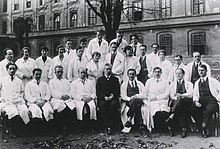Alexandra Adler

Alexandra Adler (born September 24, 1901 in Vienna , Austria-Hungary ; died January 4, 2001 in New York ) was a neurologist , psychiatrist and specialist in brain trauma.
life and work
Alexandra Adler is the daughter of Alfred Adler and Raissa Adler .
She studied medicine at the University of Vienna. After receiving her doctorate in 1926, she trained as a specialist in neurology and psychiatry at the Vienna University Clinic. Due to the politically increasingly uncertain situation in Austria, she accepted an invitation to Harvard Medical School in 1935 and moved to Boston. Since women at Harvard University did not get regular jobs at the time, she worked as a research fellow on a research team. As the first woman, she finally got a job at the Boston Municipal Hospital, which was subordinate to the university. After the death of her father in 1937, she campaigned for the spread of individual psychology and made it her life's work to manage his legacy.
From 1944 to 1946 she was visiting professor of neuropsychiatry at Duke University in North Carolina . From 1946 she lived in New York, where she a. a. worked in the Department of Neuropsychiatry at New York University. She lectured, supervised students, appeared at medical congresses, and had a private practice. In 1954 she was appointed medical director of the Mental Hygiene Clinic in New York. In the same year, the International Association for Individual Psychology in Zurich elected Alexandra Adler as its President.
Adler's scientific research focused on alcoholism , juvenile delinquency , post-traumatic stress management, and schizophrenia . Her analyzes of post-traumatic stress coping were based on her work with survivors of the fire at Cocoanut Grove in Boston in 1942. She was able to apply her findings to the treatment of soldiers during World War II. For many years she also trained psychotherapists using the Alfred Adler method. Their importance for individual psychology is compared with that of Anna Freud for psychoanalysis .
Fonts (selection)
- Alexandra Adler: self-expression. In: LJ Pongratz (Ed.): Psychotherapy in self-portrayals. Verlag Hans Huber, Bern 1973, ISBN 3-456-30584-2 , pp. 11-33.
- Alexandra Adler: Individual Psychology - Instructions for Practice. Fischer Verlag, Frankfurt am Main 1938/1990.
literature
- Katharina Kaminski: Alexandra Adler - your way between neurology and individual psychology. In: Alfred Lévy, Gerald Mackenthun (Hrsg.) :: Gestalten around Alfred Adler - pioneers of individual psychology . Königshausen & Neumann, Würzburg 2002, ISBN 3-8260-2156-8 , pp. 7-26.
- Clara Kenner: The Torn Heaven - Emigration and Exis of Viennese Individual Psychology. Vandenhoeck & Ruprecht, Göttingen 2007, ISBN 978-3-525-45320-9 , pp. 57-61.
- Uwe Henrik Peters : Psychiatry in exile: the emigration of dynamic psychiatry from Germany 1933–1939. Kupka, Düsseldorf 1992, ISBN 3-926567-04-X , pp. 144ff.
- Wolfgang Saxon: Dr. Alexandra Adler, 99, Expert on Traumas to Brain. In: The New York Times . January 12, 2001.
- Hendrika Vande Kemp: Alexandra Adler (1901-2001). In: The Feminist Psychologist. Volume 30, Number 2, Spring 2003.
Individual evidence
- ↑ Clara Kenner: Adler, Alexandra. In: Brigitta Keintzel, Ilse Korotin (ed.): Scientists in and from Austria. Life - work - work. Böhlau, Vienna / Cologne / Weimar 2002, ISBN 3-205-99467-1 , p. 7ff.
- ↑ Clara Kenner: Adler, Alexandra. In: Brigitta Keintzel, Ilse Korotin (ed.): Scientists in and from Austria. Life - work - work. Böhlau, Vienna / Cologne / Weimar 2002, ISBN 3-205-99467-1 , p. 9
| personal data | |
|---|---|
| SURNAME | Adler, Alexandra |
| BRIEF DESCRIPTION | Austrian-American neurologist, psychiatrist and specialist in brain trauma |
| DATE OF BIRTH | September 24, 1901 |
| PLACE OF BIRTH | Vienna |
| DATE OF DEATH | January 4, 2001 |
| Place of death | new York |